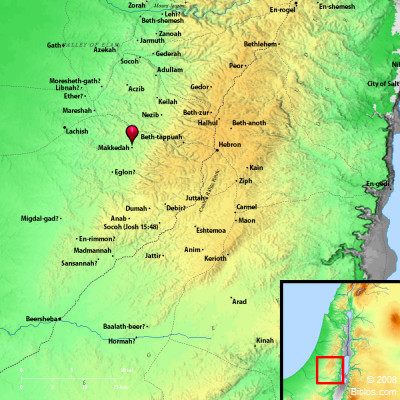Atlas  Makkedah and surrounding region Maps Created using Biblemapper 3.0 Additional data from OpenBible.info Occurrences Joshua 10:10 Yahweh confused them before Israel, and he killed them with a great slaughter at Gibeon, and chased them by the way of the ascent of Beth Horon, and struck them to Azekah and to Makkedah.Joshua 10:16 These five kings fled, and hid themselves in the cave at Makkedah. Joshua 10:17 Joshua was told, saying, "The five kings are found, hidden in the cave at Makkedah." Joshua 10:21 that all the people returned to the camp to Joshua at Makkedah in peace. None moved his tongue against any of the children of Israel. Joshua 10:23 They did so, and brought those five kings out of the cave to him: the king of Jerusalem, the king of Hebron, the king of Jarmuth, the king of Lachish, and the king of Eglon. Joshua 10:28 Joshua took Makkedah on that day, and struck it with the edge of the sword, with its king. He utterly destroyed them and all the souls who were in it. He left none remaining. He did to the king of Makkedah as he had done to the king of Jericho. Joshua 10:29 Joshua passed from Makkedah, and all Israel with him, to Libnah, and fought against Libnah. Joshua 12:16 the king of Makkedah, one; the king of Bethel, one; Joshua 15:41 Gederoth, Beth Dagon, Naamah, and Makkedah; sixteen cities with their villages. Encyclopedia MAKKEDAHma-ke'-da (maqqedhah; Makeda): A Canaanite royal city which Joshua captured, utterly destroying the inhabitants, and doing to the king as he had done unto the king of Jericho (Joshua 10:28; Joshua 12:16). It lay in the Shephelah of Judah (Joshua 15:41). It was brought into prominence by the flight thither of the 5 kings of the Amorites who, having united their forces for the destruction of Gibeon, were themselves defeated and pursued by Joshua (chapter 10). See ing their danger, the men of Gibeon sent to the camp at Gilgal beseeching Joshua to save and help them. That energetic commander marched all night with his full strength, fell upon the allies at Gibeon, slew them with a great slaughter, chased the fugitives down the valley by way of Beth-horon, and smote them unto Azekah and unto Makkedah. It was during this memorable pursuit that in response to Joshua's appeal: Strong's Hebrew H4719: Maqqedaha place in Judah |



